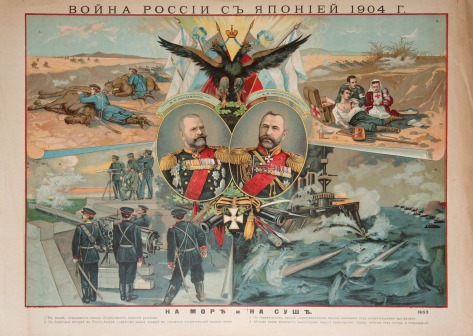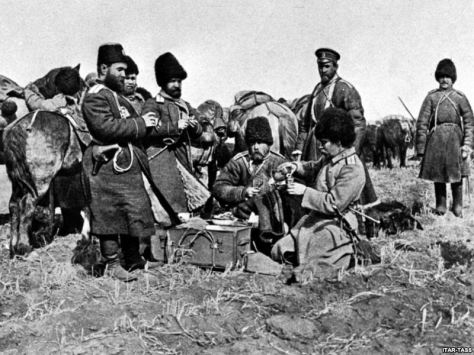The Russo-Japanese War of 1904-1905 was to prove advantageous for Japan and its Western maritime backers Britain and the United States, while the conflict was a multifaceted disaster for Russia. Amidst the bloodshed, however, were found moments of chivalry exemplified by the warriors of each side. Here is one such account:
Hunter and scout Vasilii Timofeevich Riabov was born in 1871 and grew up in the village of Ivanovka outside Penza. Almost a century and a half has gone by, yet his memory persists through the centuries.
After his discharge from active military duty and joining the reserve, Riabov relocated to the neighboring village of Lebedevka. He was a brave and active man, he loved the theater and his wife, even though he sometimes hit her after drinking. And sometimes he used other people’s things without permission. That happened too. But he atoned for all his sins with his act of bravery.
From the beginning of the [Russo-Japanese War], Riabov enlisted as a volunteer in the 284th Chembarskii Infantry Regiment. It was in its ranks that he participated in the battles that took place in Manchuria. He served on the hunting team, which is what they called volunteer scouts in those days. With the help of gestures, facial expressions, and gait, he could imitate the Chinese locals, which often amused his friends.
Following the battle of Liaoyang, in the autumn of 1904, the Russian command badly required new information about the location of enemy units. On 14 (27) September of 1904, Vasilii Riabov volunteered to go on a reconnaissance mission disguised as a Chinese peasant wearing a false braid attached to the back of his head.
The Japanese did not discover this Russian reconnaissance scout, and Riabov was already on the way back to his unit. However, an officer passing by ordered him to give water to his horse. Riabov, who did not know the Chinese language, perhaps did not understand the order or carried it out inaccurately. As a result, the irate Japanese officer pulled his braid, which…fell off. That’s how everything became clear.

The military scout was tried as a spy and sentenced to death. Vasilii Timofeevich met his death with dignity with the name of the Motherland on his lips, while remaining faithful to his military oath. The courage of this Russian soldier made such a deep impression on the enemy that they began to consider him a “Russian samurai.”
A day later, the patrol of the 1st Orenburg Cossack Regiment came across a letter left near a lonely oak tree on neutral territory. The letter read:
Reserve soldier Vasilii Riabov, 33 years old, from the hunting team of the 284th Chembarskii Infantry Regiment, born in the province of Penza, Penza uezd, Lebedevka village, dressed as a Chinese peasant, was captured on September 17, 1904 on the frontlines by our soldiers. According to his oral testimony, it became clear that he was sent to us on a reconnaissance mission to discover the location and actions of our army upon his own wish and made his way toward our troops through Yantai on September 14 following the southeastern direction. After reviewing the case in proper order, Riabov was sentenced to death. The latter was carried out on September 17 with a rifle shot.
In bringing this event to the attention of the Russian Army, our Army cannot but express our sincere wishes to your respected Army so that it rears more of such wonderful soldiers like the aforementioned Riabov, who is worthy of complete respect. Our sympathy for this truly brave man—overwhelmed by his sense duty—and an exemplary soldier reaches the utmost limit.
Respectfully,
Staff Captain of the Japanese Army.
There was a note in the Chinese language attached to the letter, which warned local residents against destroying it along with the diagram of the area, where the execution to place, and the hero’s remains rested.
Tsar Nicholas II learned about the Penza scout and used his highest command to establish a committee on immortalizing the hero. Donations came from all across Russia. Gymnasium students sent anywhere from four to 25 kopecks. In total, donations to help his family comprised seven thousand rubles along with an additional 2,569 rubles for the construction of a school.
By the order of the Tsar, Riabov’s family received a thousand rubles, and his children were sent to state schools.

This warrior-scout was forever enlisted in the 284th Chembarskii Regiment, as was stated in the order: “For the edification of posterity.” After the merger with the 216th Insarskii Regiment, he was listed as part of the 5th Company of the 2nd Battalion.
On October 6, 1909, Riabov’s remains were transferred from Manchuria to the village of Lebedevka, where he was buried with all the military honors near a school built in the memory of Vasilii Timofeevich.
Crowds carrying icons and flowers met the train transporting the hero’s remains starting from Chita. A military orchestra met the coffin in Penza along with a half-Company from the local garrison, priests, and countless civilians.
The original Church of Christ the Savior in Moscow was considered to be the main military cathedral in Russia. Among the numerous marble slabs, featuring carved names of generals and officers, who died in various wars, there was only one memorial plaque dedicated to the ordinary soldier. It had only 17 names. And among them was Vasilii Timofeevich Riabov.
Excerpted and translated by Nina Kouprianova


Great story.
LikeLike
Very interesting. My children’s great, great grandfather was a Japanese general in that war and was decorated by the Emperor bringing great respect to the family who lived on Sado Island in the Sea of Japan.
LikeLike
Reblogged this on Nina Kouprianova and commented:
Those who know me personally are aware of my long-standing interest in Japan. Translating a piece on a surprising and worthwhile story that took place during the Russo-Japanese War is one way of showcasing it.
LikeLike